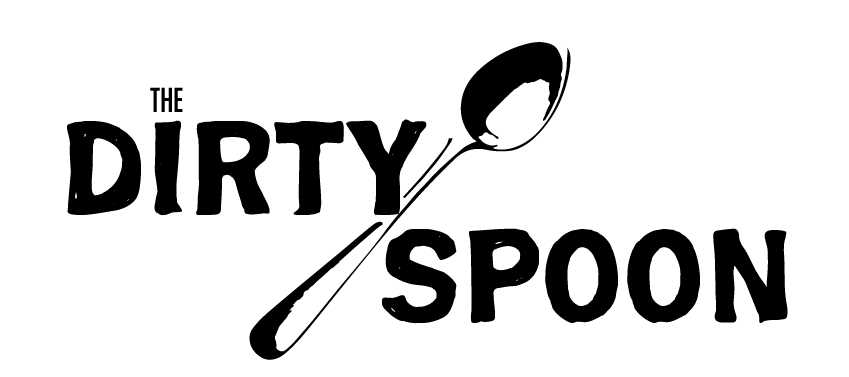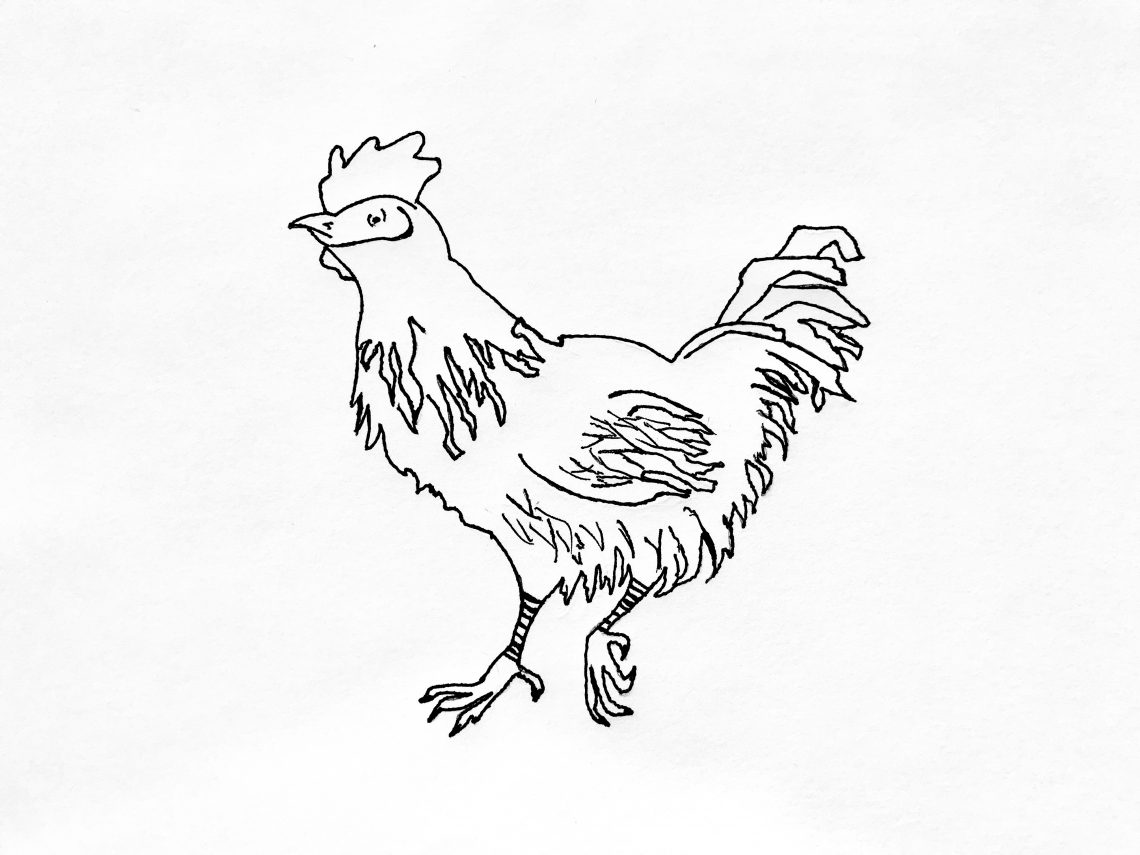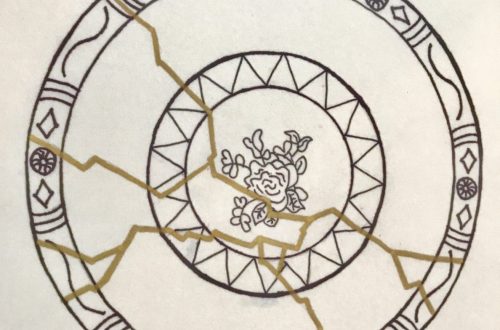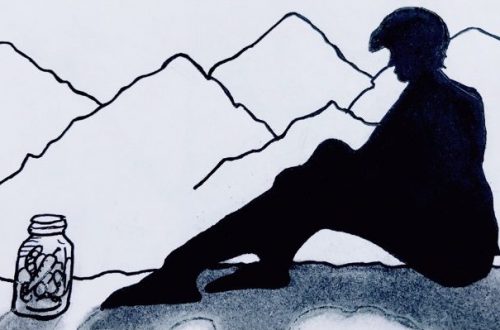by Anna Nguyen
Anna’s piece, “Birdman,” also aired in Episode 15 of The Dirty Spoon Radio Hour on October 4, 2019. Listen here:
We parked the car somewhere in Black Rock, a residential, waterfront neighborhood in Bridgeport, Connecticut, and headed to the main street to eat dinner at Birdman Juke Joint, the new restaurant conceptualized by Chef Chris Scott. As we walked, I looked around at my surroundings. It’s a cozy East Coast suburb, where beach-style family homes in various color palettes and bricks and store signs that portray the old-town charm contrast evidence of modern upkeep. As we got closer to Fairfield Avenue, the streets were full of slow drivers looking for parking or groups of people on foot looking for dinner options on a Friday night.
“This is it,” my partner Matthew announced. We stood in front of the restaurant, the building with brick walls and a rusty awning with a corrugated metal roof. I didn’t see a sign.
We walked into Birdman. Chris had told me he was not going to be in that night.
***
Birdman has been open for about three months now, and Chris regularly updates me about news and restaurant stories via social media and WhatsApp. He lives in Queens, NY with his family, and he often commuted two hours to Bridgeport to prep for his restaurant’s opening and dinners.
“When we opened up, I was there pretty much seven days a week,” said Chris during a phone interview a week after I visited Birdman. “I would sleep there maybe one to two days a week. I would be there, like 9:45, 10 a.m. until closing, seven days a week. I had bought myself a little cot, and I would either sleep in the restaurant or there was a buddy that would let me crash on his couch, or I would try to stay in a hotel. But that was pretty much working seven days a week, trying to get it set, trying to get it ready, trying to get standards up, trying to get the purveyors in line, trying to get staffed. You know, trying to get it ready.”
When I first reached out to him to talk about a story pitch, Chris excitedly sent me messages about Birdman’s opening in June of this year.
These messages were mixed with other tidbits about working in the restaurant industry as a black chef, his family life, and the beginning of my understanding of Birdman’s narrative. Chris emphasized that the story, based on slaves who tended to the chickens during the Antebellum era and after slavery, is one of resilience and triumph, something he repeated throughout our conversation.
But those trips to Bridgeport began to decrease. He began showing up once or twice a week. In his messages to me, Chris expressed doubts regarding the way the menu was developing and, most importantly, the story of Birdman. Chris seemed aware that the draw of his new restaurant was primarily advertised through his participation on Top Chef, but he wanted Birdman to be about the story of Birdman.
The concept of the Birdman, or Birdwoman, is centered on “the individual from the farm or plantation, who tended to the birds from egg to slaughter,” said Chris of the name he created. “He was basically a chicken farmer.”
Even after slavery, these farmers took their chicken husbandry skills and their farming skills to continue to make a better way of life, he said. Noting the importance of the role of agriculture, the chicken, and their food work, Chris centered the story of Birdman so that his diners had a story and history of the food. He started to connect the culture and history he was reading with his own personal family history, digging back to seven generations of his own family line.
“I’m the type of person that I’m reading something, especially history, I like to really submerge myself into that story,” Chris said. “So as I’m reading it, I’m on the plantation as well. I’m looking around. I’m feeling what they’re feeling. I’m seeing what they’re seeing. I’m eating what they’re eating. And in that backdrop, or somewhere in that scene, there’s always the Birdman.”
“I’m looking around. I’m feeling what they’re feeling. I’m seeing what they’re seeing. I’m eating what they’re eating. And in that backdrop, or somewhere in that scene, there’s always the Birdman.” – Chris Scott
Connecting his own research about the history of chicken farmers from books written by culinary historian Michael Twitty, Dr. Psyche Williams-Forson, and other authors, Chris reached out to Dr. Kelley Fanto Deetz, historian and author of Bound to the Fire: How Virginia’s Enslaved Cooks Helped Invent American Cuisine. He had read her book and, together, they began a small research project. To memorialize the story of the Birdman, Deetz helped Chris gather more oral histories and narratives from the Works Progress Administration (WPA) to flesh out the story of the folks who relied on chicken to live. In a phone interview, she highlighted the importance of oral histories, tracing them back to griots in West Africa, who archived the oral traditions of ethnic groups and narratives of their communities.
“The most common thing is often unrecorded,” Deetz said. “Everybody knows there are African Americans who are chicken farmers. They were never formally called Birdman because they were hidden in plain sight.”
The Birdman does not represent a single person, but a community of farmers “or even a history of black entrepreneurs,” Deetz said.
The name Birdman is significant to Chris as a historical food narrative that can subvert stereotypes about particular Southern food.
“When the opportunity came to have this restaurant, I thought, why don’t I name it after this person just so that it’s not another regular fried chicken restaurant,” Chris said. “But this one has the depth of the story behind it, and let’s match it alongside legendary fried chicken restaurants, sort of like Prince’s Fried Chicken or Harold’s up in Chicago.”
The name Birdman is significant to Chris as a historical food narrative that can subvert stereotypes about particular Southern food.
Indeed, Chris acknowledges the problematic stigma of fried chicken and black communities, a common topic that intersects food appropriation and the privilege of white perspectives. In a recent essay for The Huffington Post, food and travel writer Nneka M. Okona reflects on an August 1937 issue of Life Magazine. On this particular issue, a photograph of a black man named Roy E. Parrish sitting on the back of a truck filled with watermelons. Although she writes that one may have viewed this image as one about hard work and harvesting, she observes the lasting negative food stereotypes that have impacted African American communities. At the end of her essay, Okona writes that learning the history and unpacking these symbols can make them lose their power of the oppressors.
For Chris, fried chicken has always been significant in his career. At Butterfunk, his previous restaurant in Brooklyn, fried chicken was also a praised staple. But he wants us, his diners, to understand and respect the complete, holistic narrative practice of Birdman’s story and appreciate the beauty of the bird rather than the negative aspects of it. Of course the role of food is important in any restaurant, but Chris hopes that people will become more interested in the story behind Birdman and that it is able to exist because of the historical significance.
“It’s so much more than just fried chicken,” Chris said. “But, at the same time, it’s about the fried chicken.”
***
My partner and I arrived sometime after 6:30, two and a half hours after dinner service began. The restaurant was already quite busy. All of the seats at the bar were taken, and there were many families talking loudly to each other.
As we followed our waiter, I saw that the left wall was lined with framed photos, which Chris later told me were four generations of his relatives.
As we waited for our food, I kept remarking on the details that I know were significant to Chris and to the story of the Birdman. The chicken wire that framed the windows. The old-school juke joint decor and the chicken wallpaper on some parts of the wall. The Butterfunk sign towards the back of the restaurant, a happy reminder of the precursor of Birdman. The chicken shack replica located near the small window into the kitchen.
Matthew had been listening to me point out the decor of the restaurant.
“You know, I wouldn’t have known the story of Birdman if you didn’t tell me,” he said thoughtfully, his eyes scanning the restaurant. “I would have missed a lot of the details because I don’t know the story as well as you do, or if I didn’t do the background research.”
He’s right, and this is something that Chris keeps returning to, on how to simultaneously enjoy the food and bring proper attention to Birdman the story. When I brought this up to Chris, he cautiously said that any chicken-themed restaurants runs the risk of being “another chicken or Southern restaurant,” but that there should be an educating moment between server or the restaurant team and diner.
This feature of dining is not new, and it is something that has been discussed in Mary Douglas’ seminal essay, “Deciphering a Meal” published in 1972. Although she does not explicitly talk about aesthetics, Douglas provocatively wonders what are the precoded messages of food, if food is viewed as a code or a form of language. She writes that the messages of food can reveal patterns of social relations being expressed.
Very much an analysis of rhetoric, Douglas’ primary questions can be summarized: what is the meaning of a meal and what meanings remain when it is removed from its original social (or historical) context?
What is the meaning of a meal and what meanings remain when it is removed from its original social (or historical) context?
These thoughts distracted me throughout the meal. Matthew had ordered the signature lemonade buttermilk fried chicken and I a bowl of seared cauliflower, rice, black eyed peas and kale. As he marvelled at his meal – “I’ve never had fried chicken like this before” – I ate my slightly too salty bowl and looked at the now very busy restaurant and kitchen staff. Did they know the story of Birdman and what fried chicken meant to the Birdman? Can we continue to “simply” enjoy food without willful ignorance of their historical and social context?
Chris noted that the diners do enjoy the food at Birdman. Even before its opening, he remembered the welcoming reception of the community in Black Rock at the pop-ups and events he participated in to drum up interest for his new restaurant.
As he was telling the story of Birdman at an event in Hartford, Chris suddenly realized that not everyone would appreciate the lessons of the story.
“I guess someone thought that I was like a loose cannon,” Chris said, recalling an event in Hartford. “They thought I was on some Farrakhan trip, and thought that maybe the story of the Birdman was a little too political, a little too black. But there’s no beauty when it comes to slavery. It’s a message that needs to be a part of that story, in order for you to get, and for you to understand it, and for you to be able to feel it. You have to take the good, the bad, and the ugly with it all.”
“They thought I was on some Farrakhan trip, and thought that maybe the story of the Birdman was a little too political, a little too black.” — Chris Scott
I’ve been seeing a lot of exchanges about the emptiness of the phrase “all food is political.” Many have dismissed it as a truism. Others conveniently separate food, or any object, from its political sphere.
But perhaps the best way to unpack this statement is to thoughtfully question what do we mean by politics and whose politics. Perhaps we need to think about what it means to be supportive to black chefs like Chris Scott without having to worry about guilty consumption. Or how, to update Douglas’ questions, can we confront those who try to remove the history of the Birdman?
“We ignore what we want to ignore,” Deetz told me. “We don’t want to conjure up shameful histories of our past, and we pick and choose what their history is. It’s the same with how they pick and choose their food. At some point, we have to deal with the emotions and the past of the food, and appreciate that Chris is putting his heart, his soul, his skill, and talent of his ancestors in the food.”
But Birdman is still a business.
When Chris is at the restaurant, he will share stories about the Birdman, about his family, about the food, but not without remembering that incident in Hartford. He has hinted that, since then, he feels muted, careful not to offend.
“I never thought that I was doing that before, which is kind of a shame because, then, the real story of what I’m trying to say never really gets out there the way it should be,” he said. He contrasts his experiences at Birdman with that of Butterfunk. Whenever he brought up Butterfunk, he seemed nostalgic for a time where his diners genuinely appreciated felt the story of his family and what they meant to him.
***
By the time we left the restaurant, the traffic in the restaurant was consistently busy. As we started to drive away, we passed a sign that read “Welcome to Historic Black Rock.”
Custom illustrations by Corinne Pease.

About Anna Nguyen
Born and raised in Fayetteville, Arkansas, Anna Nguyen is currently a doctoral student at L’institut national de la recherche scientifique (INRS) in Montreal, Canada. She examines literary and technoscientific representations of food in society. Her academic and personal essays reflect a core interest in how we communicate our values for science and technology using food as an everyday metaphor. Some of her work can be found on www.ilostmyappetite.com.






